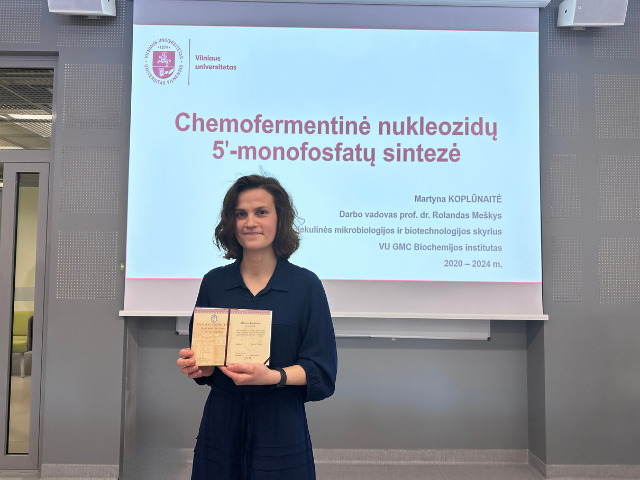Martyna Koplūnaitė has defended her thesis entitled "Chemoenzymatic synthesis of nucleoside 5'-monophosphates" for the degree of Doctor of Science in Biochemistry.
Scientific supervisors: Dr. Daiva Tauraitė (Vilnius University, Natural Sciences, Biochemistry) from October 01, 2020, till November 30, 2021; Prof. Dr. Rolandas Meškys (Vilnius University, Natural Sciences, Biochemistry) from December 01, 2021, till September 30, 2024.
Composition of the Dissertation Defence Board: Chairperson - Dr. Julija Armalytė (Vilnius University, Natural Sciences, Biology); Dr. Renata Gudiukaitė (Vilnius University, Natural Sciences, Biology); Dr. Mantas Mališauskas (Lundbeck, Denmark, Natural Sciences, Biochemistry); Prof. Dr. Saulius Serva (Vilnius University, Natural Sciences, Biochemistry); Dr. Asta Zubrienė (Vilnius University, Natural Sciences, Biochemistry).
Nucleoside and nucleotide analogs are widely used in biochemistry, molecular biology, and pharmacology. These compounds serve as substrates or inhibitors in enzymatic reactions and play a crucial role in nucleic acid research and RNA vaccines. Additionally, certain analogs are known for their anticancer and antiviral properties.
In this study, novel N4-amino acid-modified deoxycytidine nucleosides were synthesized, expanding the existing library of nucleoside analogs. The newly synthesized compounds, along with additional pyrimidine nucleoside analogs, were investigated as substrates for Drosophila melanogaster deoxynucleoside kinase (DmdNK) and Bacillus subtilis deoxycytidine kinase (BsdCK). It was determined that wild-type DmdNK and BsdCK exhibit activity toward pyrimidine nucleosides with minor modifications at the N4/O4 and C5 positions.
The application of nucleoside kinases, combined with a phosphate donor regeneration system, for the milligram-scale synthesis of nucleoside monophosphates, demonstrated that these enzymes can be utilized to produce larger quantities of nucleotides. Finally, the study showed that targeted mutagenesis of specific amino acids in the active sites of DmdNK and BsdCK can enhance their activity toward N4-modified nucleosides, enabling their adaptation for desired substrates.
 |
